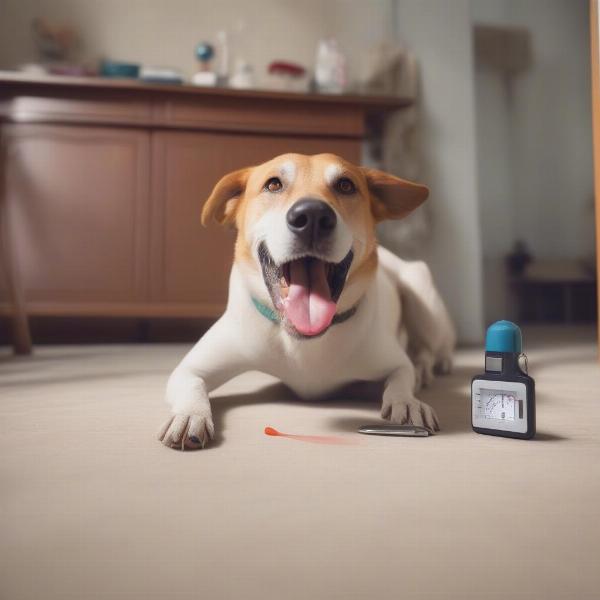Dog panting at night can be concerning for owners. While panting is a normal way for dogs to regulate their body temperature, excessive or unusual panting at night could indicate an underlying issue. Understanding the reasons behind your dog panting at night is crucial for providing the best care. This article will explore various causes of nighttime panting in dogs, from simple solutions like adjusting the room temperature to more serious medical conditions requiring veterinary attention. We’ll also provide practical tips to help your furry friend sleep comfortably through the night.
Why is My Dog Panting at Night?
Several factors can contribute to dog panting at night. Sometimes, the reason is simple and easily remedied, while other times, it may signal a more serious health concern.
Environmental Factors
Is your house too warm? Dogs don’t sweat like humans, so they rely on panting to cool down. A warm room can make your dog pant excessively, especially at night.  Dog panting in a hot room Even a slightly elevated temperature can disrupt their sleep. Similarly, humidity can also make it harder for dogs to cool down, leading to increased panting.
Dog panting in a hot room Even a slightly elevated temperature can disrupt their sleep. Similarly, humidity can also make it harder for dogs to cool down, leading to increased panting.
Anxiety and Stress
Just like us, dogs can experience anxiety and stress. This can manifest as panting, pacing, whining, or even destructive behavior. Nighttime can be particularly challenging for anxious dogs, especially if they are left alone. Loud noises, thunderstorms, or changes in routine can trigger anxiety and lead to panting.
Pain or Discomfort
Panting can be a sign of pain or discomfort. If your dog is injured or suffering from a medical condition, they may pant more at night due to increased sensitivity or difficulty finding a comfortable position. Arthritis, for example, can cause stiffness and pain, leading to panting, especially in older dogs.
Medical Conditions
Certain medical conditions can also cause increased panting. Heart and respiratory problems, such as heart failure or asthma, can make it difficult for dogs to breathe, resulting in panting. older dog panting at night may be more susceptible to these conditions. Other medical conditions like Cushing’s disease, anemia, and bloat can also cause panting.
What to Do if Your Dog is Panting at Night
If your dog is panting excessively or exhibiting other unusual symptoms, it’s crucial to consult a veterinarian. panting dog at night warrants investigation, particularly if it’s a new behavior or accompanied by other symptoms like restlessness, pacing, or changes in appetite.
Here are some tips to help address nighttime panting:
- Ensure a Comfortable Temperature: Maintain a cool and well-ventilated room for your dog, especially during warmer months. Consider using a fan or air conditioning to keep the temperature down.
- Create a Calming Environment: Provide a comfortable bed and a quiet space for your dog to relax. Consider using calming aids like pheromone diffusers or white noise machines. dog pacing and panting at night could be a sign of anxiety and may benefit from a calming routine.
- Regular Exercise: Ensure your dog gets sufficient exercise during the day. A tired dog is more likely to sleep soundly through the night.
- Rule Out Medical Conditions: If the panting persists or is accompanied by other symptoms, a veterinary checkup is essential to rule out underlying medical conditions. excessive panting in dogs at night can indicate a serious health issue.
- Provide Fresh Water: Always ensure your dog has access to fresh, cool water, especially at night.
Conclusion
Dog panting at night can stem from various causes, from a warm room to underlying health issues. By understanding these causes and taking appropriate steps, you can ensure your furry friend enjoys a comfortable and peaceful night’s sleep. If the panting is excessive, persistent, or accompanied by other symptoms, don’t hesitate to consult your veterinarian for professional advice. old dog panting at night especially requires careful monitoring.
FAQ
- Is it normal for a dog to pant a little at night? Some panting is normal, especially if the room is warm. However, excessive or unusual panting warrants further investigation.
- When should I be concerned about my dog panting at night? If the panting is persistent, excessive, or accompanied by other symptoms like restlessness, pacing, or changes in appetite, consult your veterinarian.
- Can anxiety cause a dog to pant at night? Yes, anxiety and stress can lead to panting, especially during the night.
- What medical conditions can cause dog panting at night? Heart and respiratory problems, pain, and certain hormonal imbalances can cause increased panting.
- How can I help my anxious dog stop panting at night? Create a calming environment, provide a comfortable bed, and consider using calming aids like pheromone diffusers.
- How can I tell if my dog is panting due to pain? Other signs of pain may include whining, limping, reluctance to move, and changes in behavior.
- Is it ever an emergency if my dog is panting at night? If the panting is severe, accompanied by other symptoms like pale gums or difficulty breathing, seek immediate veterinary attention.
ILM Dog is your global resource for expert advice on dog care and wellbeing. We offer comprehensive information on breed selection, health, training, nutrition, grooming, and more. From puppy care to senior dog support, we’re here to help you provide the best possible care for your canine companion. Whether you need help with dog panting at night, or are just looking for general tips on dog care, ILM Dog is the website for you. Contact us for any questions or concerns at [email protected] or +44 20-3965-8624. We look forward to hearing from you!